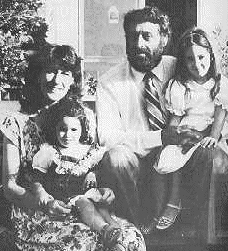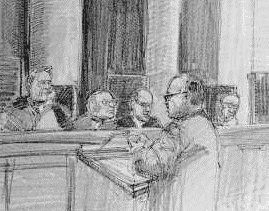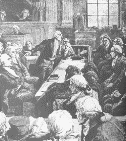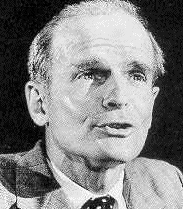|
Introduction
The
Constitution contains no provision explicitly
declaring that the powers of the three branches of
the federal government shall be separated.
James Madison, in his original draft of what would
become the Bill of Rights, included a proposed
amendment that would make the separation of powers
explicit, but his proposal was rejected, largely
because his fellow members of Congress thought the
separation of powers principle to be implicit in
the structure of government under the
Constitution. Madison's proposed amendment,
they concluded, would be a redundancy.
The
first article of the Constitution says "ALL
legislative powers...shall be vested in a
Congress." The second article vests "the
executive power...in a President." The third
article places the "judicial power of the United
States in one Supreme Court" and "in such inferior
Courts as the Congress...may establish."
Separation
of powers serves several goals.
Separation prevents
concentration of power (seen as the root of
tyranny) and provides each branch with weapons to
fight off encroachment by the other two
branches. As James Madison argued in the
Federalist Papers (No. 51), "Ambition must be made
to counteract ambition." Clearly, our system
of separated powers is not designed to maximize
efficiency; it is designed to maximize freedom.
EXECUTIVE ENCROACHMENTS
Two very
different views of executive power have been
articulated by past presidents. One view, the
"strong president" view, favored by presidents such
as Theodore Roosevelt essentially held that
presidents may do anything not specifically
prohibited by the Constitution. The other,
"weak president" view, favored by presidents such as
Howard Taft, held that presidents may only exercise
powers specifically granted by the Constitution or
delegated to the president by Congress under one of
its enumerated powers.
Our
readings include two cases dealing with the
breadth of executive power. Youngstown
Sheet & Tube Co. v Sawyer (1952) arose
when President Harry Truman, responding to labor
unrest at the nation's steel mills during the
Korean War, seized control of the mills.
Although a six-member majority of the Court
concluded that Truman's action exceeded his
authority under the Constitution, seven justices
indicated that the power of the President is not
limited to those powers expressly granted in
Article II. Had the Congress not impliedly
or expressly disapproved of Truman's seizure of
the mills, the action would have been
upheld.

President Harry Truman announcing the seizure of
steel mills on April 8, 1952 |

Inland Steel president Clarence Randall responds
to steel mill seizure |
Dames
and More v Regan (1981) considered the
constitutionality of executive orders issued by
President Jimmy Carter directing claims by
Americans against Iran to a specially-created
tribunal. The Court, using a pragmatic
rather than literalist approach, found the
executive orders to be a constitutional exercise
of the President's Article II powers. The
Court noted that similar restrictions on claims
against foreign governments had been made at
various times by prior presidents and the Congress
had never in those incidents, or the present one,
indicated its objection to the practice.
CONGRESSIONAL ENCROACHMENTS
In INS
v Chadha (1983), the Court considered the
constitutionality of "the legislative veto," a
commonly-used practice authorized in 196 different
statutes at the time. Legislative veto
provisions authorized Congress to nullify by
resolution a disapproved-of action by an agency of
the executive branch. Chadha contended that
congressional action overturning an INS decision
suspending his deportation constituted legislative
action that failed to comply with the requirements
for legislation spelled out in Article I, Section 7
of the Constitution. The Court agreed.

Jadish Rai Chadha and family
[NY Times photo]
In Bowsher
v
Synar (1986), the Court invalidated a
provision of the Balanced Budget Act that
authorized Charles Bowsher, as Comptroller General
of the U.S., to order the impoundment of funds
appropriated for domestic or military use when he
determined the federal budget was in a deficit
situation. The Court concluded that allowing
the exercise of this executive power by the
Comptroller General, an officer--in the Court's
view--in the legislative branch, would be "in
essence, to permit a legislative veto."
Morrison
v Olson considered the constitutionality of
the "Independent Counsel" (or "special
prosecutor") provisions in the Ethics in
Government Act. The Court had considerable
difficulty in identifying in which of the three
branches of government the independent counsel
belonged. Justice Rehnquist's opinion for
the Court in Morrison took a pragmatic
view of government, upholding the independent
counsel provisions. Rehnquist noted that the
creation of the independent counsel position did
not represent an attempt by any branch to increase
its own powers at the expense of another branch,
and that the executive branch maintained
"meaningful" controls over the counsel's exercise
of his or her authority. In an angry
dissent, Justice Scalia called the Court's opinion
"a revolution in constitutional law" and said
"without separation of powers, the Bill of Rights
is worthless." Justice Scalia dissented again in Mistretta
v U. S.(1989), a decision upholding
legislation which delegated to the seven-member
United States Sentencing Commission (a commission
which included three federal judges) the power to
promulgate sentencing guidelines
In
2020, in Seila Law v CFPB, the Court found
that the structure of the Consumer Financial
Protection Board violated the Constitution's
separation of powers because it was an independent
agency headed by a single Director who exercised
substantial executive power, but who could be
removed by the President only for cause.
EXECUTIVE PRIVILEGE AND IMMUNITIES

President Nixon's attorney, James
St. Clair, arguing the Watergate tapes
case before the U. S. Supreme Court
Executive
privilege, the right of the President to withhold
certain information sought by another branch of
government, was first claimed by President Jefferson
in response to a subpoena from John Marshall in the
famous treason trial of Aaron Burr. The
Supreme Court's first major pronouncement on the
issue, however, did not come until 1974 in United
States v Richard Nixon. The case
involved the refusal of President Nixon to turn over
to Watergate Special Prosecutor Leon Jaworski
several hours of Oval Office tapes believed to
concern the Watergate break-in and subsequent
cover-up. Although the Court unanimously
concluded that the Constitution does indeed contain
an executive privilege, the Court said the privilege
was "presumptive" and not absolute. Balancing
the interests in the Nixon case, the Court
found the privilege not to extend to the requested
Watergate tapes.
In Clinton
v
Jones (1997), the Court rejected President
Clinton's argument that the Constitution
immunizes him from suits for money damages
for acts committed before assuming the
presidency. The case arose when Paula Jones
filed a suit alleging sexual harassment by Clinton
in an Arkansas hotel room in 1991 while Clinton
served as Governor of Arkansas.
Finally,
in Trump v Mazars, the Court considered
Congressional subpoenas demanding that the various
parties turn over financial records relating to
the activities of Donald Trump and his
businesses. The Court unanimously rejected
the president's claim of absolute privilege.
By a 7 to 2 votes, with Chief Justice Roberts
writing the opinion, the Court laid out a
four-part test courts should use in determining
whether to require that the subpoenaed
documents be turned over. The test attempts
to balance Congress's important interest in
obtaining information relevant to its
constitutional duties, and the president's
interest in not being targeted for political
reasons and thus hindered in his or her own
ability to carry out duties under Article II.
Executive
Privilege and the Treason Trial of Aaron
Burr

In 1807, Chief Justice John Marshall sat as
the trial judge in the treason trial of former
Vice President Aaron Burr. Burr, who was
accused of working with Spain to start a war in
the Southern territories and Texas (with the
suggestion that he would become the leader of a
newly-created western empire), requested that
the court subpoena certain letters of Thomas
Jefferson that might demonstrate that his arrest
was politically motivated. Marshall issued
the subpoena stating, "Courts should issue
subpoenas based on the character of the
information sought, not the character of the
person who holds it." In letters to John
Marshall, Thomas Jefferson respectfully
disagreed, but turned over the letters anyway,
thus avoiding a constitutional showdown.
To read more about the case, and to read
Jefferson's letters to Marshall click on the
following link:
|
CONGRESSIONAL IMMUNITY UNDER THE
SPEECH AND DEBATE CLAUSE
The framers sought in various ways to
guarantee the independence of each of the three
branches. The President was protected
against criminal prosecutions while in office,
answerable only in an impeachment trial with a
super-majority required to convict. Members
of the federal judiciary were given lifetime
tenure, with a guarantee that their compensation
would not be reduced. To ensure free
discussion of controversial issues in Congress,
the framers immunized members of Congress from
liability for statements made in House or Senate
debate: for their "speech or debate" they
"shall not be questioned in any other place." (Link)
 Senator Proxmire of Wisconsin.
Proxmire's awarding of his "Golden Fleece" award to
Dr. Ronald Hutchinson led to a defamation
suit-- and a Supreme Court decision interpreting the
Speech and Debate Clause.
Senator Proxmire of Wisconsin.
Proxmire's awarding of his "Golden Fleece" award to
Dr. Ronald Hutchinson led to a defamation
suit-- and a Supreme Court decision interpreting the
Speech and Debate Clause.
In 1979, in Hutchinson v Proxmire,
the Court considered whether the immunity for
Senate and House debate extended beyond the
floor to cover press releases and statements
made to the media. The Court concluded
that the Speech and Debate Clause protected only
official congressional business, not statements
for public consumption.
CONGRESSIONAL ENCROACHMENT ON
JUDICIAL POWERS
Art.
III, Section. 2.
The judicial Power shall extend to all Cases,
in Law and Equity, arising under this
Constitution, the Laws of the United States,
and Treaties made, or which shall be made,
under their Authority....
In all Cases affecting Ambassadors,
other public Ministers and Consuls, and
those in which a State shall be Party, the
supreme Court shall have original
Jurisdiction. In all the other Cases before
mentioned, the supreme Court shall have
appellate Jurisdiction, both as to Law and
Fact, with
such Exceptions, and under such
Regulations as the Congress shall make.
|
In Ex Parte McCardle (1868) the Court
decided it lacked jurisdiction to consider the
habeas corpus petition of William McCardle, a
Vicksburg, Mississippi newspaper editor arrested by
military official for writing incendiary editorials
about the federal officers then in control of
Mississippi during Reconstruction. Although
McCardle made his petition under the 1867 Habeas
Corpus Act, Congress repealed the provision
authorizing McCardle's petition AFTER the Court had
heard arguments in his appeal. Although it was
obvious that Congress repealed the provision in an
attempt to specifically deprive McCardle of the
opportunity to gain release from military custody,
the Court nonetheless upheld the validity of the Act
and found itself without jurisdiction. Many
subsequent commentators, including conservative
judge Robert Bork, have criticized the Court's
decision in McCardle and have predicted that it
would not be followed today.
|
Cases
Executive
Encroachments on Legislative Powers
Youngstown Sheet
& Tube Co. v Sawyer (1952)
Dames & Moore v
Regan (1981)
Congressional
Encroachment
on Executive Powers
INS v Chadha (1983)
Bowsher v Synar (1986)
Morrison v Olson
(1988)
Seila Law v CFPB
(2020)
Judicial
Encroachment on Legislative Powers
Mistretta v U. S.
(1989)
Executive
Privilege and Immunities
United States v Nixon
(1974)
Clinton v Jones
(1997)
Trump
v Mazars (2020)
Congressional
Immunity:
Speech & Debate Clause
Hutchinson v
Proxmire (1979)
Congressional
Encroachment
on Judicial Powers
Ex Parte McCardle
(1868)
|
Separation of Powers
Provisions in the Constitution
Article I, Section. 1:
All legislative Powers herein granted shall be
vested in a Congress of the United States,
which shall consist of a Senate and House of
Representatives.
Article II, Section. 1:
The executive Power shall be vested in a
President of the United States of
America.
Article III, Section. 1:
The judicial Power of the United States shall
be vested in one supreme Court, and in such
inferior Courts as the Congress may from time
to time ordain and establish.
Article I, Section. 7:
All Bills for raising Revenue shall originate
in the House of Representatives; but the
Senate may propose or concur with Amendments
as on other Bills. Every Bill which shall have
passed the House of Representatives and the
Senate, shall, before it become a Law, be
presented to the President of the United
States: If he approve he shall sign it, but if
not he shall return it, with his Objections to
that House in which it shall have originated,
who shall enter the Objections at large on
their Journal, and proceed to reconsider it.
If after such Reconsideration two thirds of
that House shall agree to pass the Bill, it
shall be sent, together with the Objections,
to the other House, by which it shall likewise
be reconsidered, and if approved by two thirds
of that House, it shall become a Law....If any
Bill shall not be returned by the President
within ten Days (Sundays excepted) after it
shall have been presented to him, the Same
shall be a Law, in like Manner as if he had
signed it, unless the Congress by their
Adjournment prevent its Return, in which Case
it shall not be a Law.
|
Questions
1. What are some of the weapons each branch is given by
the Constitution to fend off encroachment by other
branches?
2. Which view of presidential power under the
Constitution makes the most sense to you--the "strong"
view or the "weak" view? Why? Which view has
the Court come closer to adopting?
3. How should a history of congressional inaction
in response to an assertion of presidential power be
interpreted?
4. Did the Constitution empower President Lincoln
to issue his famous Emancipation Proclamation?
5. It is not obvious that the Court has the power
to review presidential assertions of power. What
do you think about the suggestion that the Court should
refrain from reviewing these exercises of power under
"the political question" doctrine?
6. Why do you think Congress came to rely so
heavily on "legislative veto" provisions? What are
the alternatives?
7. Among the many ways of evaluating justices, one
is to measure their willingness to accept as
constitutional "pragmatic" solutions to the problems of
modern governance. On such a scale, with respect
to recent justices, might Justice White be called the
"most pragmatic" and Justice Scalia the "least
pragmatic" justice?
8. The Court seems to view the power of removal as
key to placing an official in one or another branch of
government. Why is the power of removal so
important?
9. Have special prosecutors made a positive or a
negative contribution to public life?
10. Do you accept Justice Rehnquist's argument
that the Court should be concerned when one branch seems
intent on increasing its power at the expense of other
branches, but much less so when that is not the intent
of an alleged separation of powers violation?
11. Is Justice Scalia right in suggesting, after Morrison,
we now have a "standardless judicial allocation of
powers"?
12. What do you think about the guidelines of the
U. S. Sentencing Commission? Have they served to
provide more uniform sentencing? Have they taken
too much sentencing discretion away from trial judges
and juries?
13. Could it be argued that the Federal Rules of
Civil Procedure violate constitutional separation of
powers principles?
14. Could Congress delegate all of its law-making
power to a super agency and take a long vacation?
Why would such a broad delegation violate the
Constitution? How far can Congress go in
delegating its law-making powers? When are
standards for the exercise of administrative discretion
sufficient for constitutional purposes?
15. What is the best argument for recognizing
constitutional protection for claims of executive
privilege?
16. What would happen if the President were to
ignore a direct order from the Supreme Court to respond
to a legislative or judicial branch request for
information? President Nixon promised to obey "a
definitive opinion of the Supreme Court." What do
you think he meant by "definitive opinion"?
17. Should the doctrine of executive privilege
apply differently in impeachment proceedings?
18. What's the case for making the President
immune from suits for damages while in office?
|
Background on Ex
Parte McCardle
An
Example
of one of McCardle's editorials in the
Vicksburg Times (Nov. 6, 1867):
"There is not a single shade of difference
between Schofield, Sickles, Sheridan, Pope and
Ord [generals in charge of
Reconstruction]:...They are all infamous,
cowardly, and abandoned villains who, instead
of wearing shoulder straps and ruling millions
of people should have their heads shaved,
their ears cropped, their foreheads branded,
and their persons lodged in a penitentiary."
President Johnson's message in vetoing the
Repeal Act (Johnson's Veto was subsequently
overridden.):
"I cannot give my assent to a measure which
proposes to deprive any person restrained of
his or her liberty in violation of the
Constitution...the right of appeal to the
highest judicial authority known to our
government....The Supreme Court combines
judicial wisdom and impartiality to a higher
degree than any authority known to the
Constitution; any any act which may be
construed into or mistaken for an attempt to
prevent or evade its decision on a question
which affects the liberty of the citizens and
agitates the country cannon fail to be
attended with unpropitious consequences."
McCardle's
attorney on the Supreme Court decision
against his client:
"The Court stood still to be ravished and did
not even hallo while the thing was getting
done...The whole government is so rotten and
dishonest that I can only protest. It is
drunk with blood and vomits crime
incessantly."
|
19. What should the Court have done in Ex
Parte McCardle? Consider these options: (1)
Conclude that it had already determined it had
jurisdiction and ignore the repeal act; (2) Consider the
act, but hold it inapplicable because it was enacted
after oral argument had occurred; (3) Hold that the act
violated Article I, Section 9, Clause 2 in that the
suspension of habeas corpus was not required by public
safety; (4) Hold the act violated the Fifth Amendment
because it deprived McCardle of due process of law; (5)
Hold the act violates basic separation of powers
principles and that Congress cannot curtail the
jurisdiction of the Court; (6) Uphold the act and
dismiss the case for want of jurisdiction.

Paula
Jones
The
impeachment saga of President Clinton
has its origins in a sexual harassment
lawsuit brought in Arkansas in May, 1994
by Paula
Jones, a former Arkansas state
employee. In her suit, Jones
alleged that on May 8, 1991, while she
helped to staff a state-sponsored
management conference at the Excelsior
Hotel in Little Rock, a state trooper
and member of Governor Clinton's
security detail, Danny Ferguson,
approached her and told her that the
Governor would like to meet her in his
hotel suite. Minutes later, Jones,
seeing this as an opportunity to advance
her career, took the elevator to
Clinton's suite. There, according
to her disputed account, Clinton made a
series of increasingly aggressive moves,
culminating in a request for oral sex.
Jones claimed that she stood and told
the Governor, "I'm not
that kind of girl." As she left, Clinton
allegedly stopped her by the door and said,
"You're a smart girl, let's keep this
between ourselves." (There is reason
to question Jones's story, as Clinton's
security guard reported that Jones seemed
pleased when she left the hotel room--and
that anything that happened inside appeared
to be consensual.)
Lawyers for Clinton argued that the Jones
suit would distract him from the important
tasks of his office and should not be
allowed to go forward while he occupied the
White House. Clinton's immunity claim
eventually reached the United States Supreme
Court. The Court ruled unanimously in
May, 1997 against the President, and allowed
discovery in the case to proceed. As
Federal Appeals Court Judge (and Reagan
appointee) Richard A. Posner noted in An Affair of
State: The Investigation, Impeachment, and
Trial of President Clinton, the
Court's "inept," "unpragmatic," and
"backward-looking" decision in Clinton v Jones,
and an earlier
decision by the Court upholding the
constitutionality of the act authorizing the
appointment of independent counsels,
had major consequences:
"Clinton's
affair with Monica Lewinsky, an affair
intrinsically devoid of significance to
anyone except Lewinsky, would have
remained a secret from the public.
The public would not have been worse for
not knowing about it. There would
have been no impeachment inquiry, no
impeachment, no concerns about the motives
behind the President's military actions
against terrorists and rogue states in the
summer and fall of 1998, no spectacle of
the United States Senate play-acting at
adjudication. The Supreme Court's
decisions created a situation that led the
President and his defenders into the
pattern of cornered-rat behavior that
engendered a constitutional storm and that
may have embittered American politics,
weakened the Presidency, distracted the
federal government from essential
business, and undermined the rule of law."
As a result of the Supreme Court's action,
Judge Susan Weber Wright allowed discovery
to proceed in the Paula Jones lawsuit.
Judge Wright ruled that lawyers for Jones,
in order to help prove her sexual harassment
claim, could inquire into any sexual
relationships that Clinton might have with
subordinates either as Governor of
Arkansas or as President of the United
States. A critical moment in the
cascade of events that would eventually lead
to impeachment came on December 5, 1997 when
Jones's lawyers submitted a list of women
that they would like to depose.
Included on the list the name of Monica
Lewinsky.
|
|
Court's 4-Part Test for
Analyzing Appropriateness of Congressional
Subpoena for Presidential Records (Trump v
Mazars)
First, courts should
carefully assess whether the asserted
legislative purpose warrants the significant
step of involving the President and his
papers.“ ‘[O]ccasion[s] for constitutional
confrontation between the two branches’
should be avoided whenever possible.”
Congress may not rely on the President’s
information if other sources could
reasonably provide Congress the information
it needs in light of its particular
legislative objective. The President’s
unique constitutional position means that
Congress may not look to him as a “case
study” for general legislation. . . .
Second, to narrow
the scope of possible conflict between the
branches, courts should insist on a subpoena
no broader than reasonably necessary to
support Congress’s legislative objective.
The specificity of the subpoena’s request
“serves as an important safeguard against
unnecessary intrusion into the operation of
the Office of the President.”
Third, courts should
be attentive to the nature of the evidence
offered by Congress to establish that a
subpoena advances a valid legislative
purpose. The more detailed and substantial
the evidence of Congress’s legislative
purpose, the better. That is particularly
true when Congress contemplates legislation
that raises sensitive constitutional issues,
such as legislation concerning the
Presidency. In such cases, it is
“impossible” to conclude that a subpoena is
designed to advance a valid legislative
purpose unless Congress adequately
identifies its aims and explains why the
President’s information will advance its
consideration of the possible legislation.
Fourth, courts
should be careful to assess the burdens
imposed on the President by a subpoena. We
have held that burdens on the President’s
time and attention stemming from judicial
process and litigation, without more,
generally do not cross constitutional lines.
But burdens imposed by a congressional
subpoena should be carefully scrutinized,
for they stem from a rival political branch
that has an ongoing relationship with the
President and incentives to use subpoenas
for institutional advantage.
Other considerations
may be pertinent as well; one case every two
centuries does not afford enough experience
for an exhaustive list.
|
|







